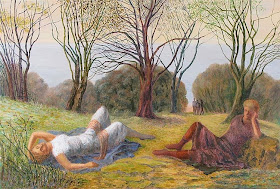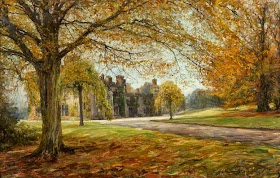All seemed still and unchangeable. I was doing my best to keep my mind empty, in deference to the World. But some lines by Wallace Stevens appeared: "He wanted to feel the same way over and over. . . . He wanted his heart to stop beating and his mind to rest/In a permanent realization." But, of course, that is not in the cards. There shall be no walking beside the river, "under the buttonwoods, beneath a moon nailed fast." For which we should be thankful.
Eliot Hodgkin, "Feathers and Hyacinth Heads" (1962)
Upon returning, the following poem by Thomas Hardy came to mind. It has appeared here before, but, as I am wont to say of poems that I like: it bears revisiting.
Autumn in King's Hintock Park
Here by the baring bough
Raking up leaves,
Often I ponder how
Springtime deceives, --
I, an old woman now,
Raking up leaves.
Here in the avenue
Raking up leaves,
Lords' ladies pass in view,
Until one heaves
Sighs at life's russet hue,
Raking up leaves!
Just as my shape you see
Raking up leaves,
I saw, when fresh and free,
Those memory weaves
Into grey ghosts by me,
Raking up leaves.
Yet, Dear, though one may sigh,
Raking up leaves,
New leaves will dance on high --
Earth never grieves! --
Will not, when missed am I
Raking up leaves.
Thomas Hardy, Time's Laughingstocks and Other Verses (1909).
Eliot Hodgkin, "Two Dead Leaves" (1963)
On a first reading, the following poem by C. H. Sisson is not as easily accessible as Hardy's poem. However, it is worth the effort to puzzle it out.
Leaves
Leaves are plentiful on the ground, under the feet,
There cannot be too many, they lie below;
They rot, they blow about before they are rotted.
Were they ever affixed to trees? I do not know.
The great connection is from the leaf to the root,
From branch, from tendril, to the low place
Below the burial ground, below the hope of the foot,
The hand stretched out, or the hidden face.
On all occasions, or most, remember this:
Then turn on yourself like a small whirlwind of leaves.
C. H. Sisson, Exactions (Carcanet 1980).
The two poems say roughly the same thing, don't they? The final two lines are particularly lovely.
Eliot Hodgkin, "Dead Leaves and Birds' Eggs" (1963)
Under Trees
Yellow tunnels under the trees, long avenues
Long as the whole of time:
A single aimless man
Carries a black garden broom.
He is too far to hear him
Wading through the leaves, down autumn
Tunnels, under yellow leaves, long avenues.
Geoffrey Grigson, Collected Poems: 1924-1962 (1963).
Eliot Hodgkin, "Leaves" (1941-1942)
































